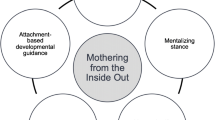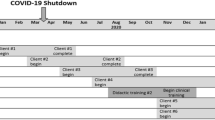Abstract
Background The RE-AIM framework was applied to the Mindfulness Based Parenting (MBP) intervention to evaluate the feasibility and effectiveness of this innovative trauma informed model in a drug treatment program. The MBP intervention is aimed at mitigating the stress experienced by women in treatment for substance use disorders, and thereby improving parenting and dyadic attachment between mother and child. Methods This was a single arm pre-test post-test design using repeated measure data collected between 2013 and 2016. The design also includes comprehensive process and impact evaluation data. Participants were 120 parenting women enrolled in an opioid treatment program between 2013 and 2016 in Philadelphia, PA. The MBP intervention included weekly 2-h MBP group sessions over 12 weeks, including three dyadic sessions with their child. The main outcomes of this study include the five facets of RE-AIM: Reach, Effectiveness, Adoption, Implementation, and Maintenance. Results The MBP intervention was associated with improvements in parenting across participants. Data showed implementation and sustainability are contingent upon a strong multidisciplinary team and clinical staff support and “buy-in”. Iterative adaptations of interventions used in the general population may be necessary when working with a traumatized population burdened by low literacy levels, trauma history and co-occurring disorders. Conclusions MBP is a feasible and effective intervention for improving parenting and dyadic attachment between women with opioid use disorder and their children, and may be useful for other programs that serve parenting women with substance use disorders.
Similar content being viewed by others
References
Atlas ti. (2013). Released 2013. Atlas for Windows, Version 7.0. ATLAS.ti Scientific Software Development GmbH. Berlin: Atlas.
Bagner, D. M., Sheinkopf, S. J., Miller-Loncar, C., LaGasse, L. L., Lester, B. M., Liu, J., Bauer, C. R., Shankaran, S., Bada, H., & Das, A. (2009). The effect of parenting stress on child behavior problems in high risk children with prenatal drug exposure. Child Psychiatry and Human Development. 40(1), 73–84. https://doi.org/10.1007/s10578-008-0109-6.
Beckwith, L., Howard, J., Espinosa, M., & Tyler, R. (1999). Psychopathology, mother-child interaction, and infant development: Substance abusing mothers and their offspring. Development and Psychopathology, 11(4), 715–725.
Bowen, S., Chawla, N., Collins, S. E., Witkiewitz, K., Hsu, S., Grow, J., Clifasefi, S., Garner, M., Douglass, A., Larimer, M. E., & Marlatt, A. (2009). Mindfulness-based relapse prevention for substance use disorders: A pilot efficacy trial. Substance Abuse, 30(4), 295–305. https://doi.org/10.1080/08897070903250084.
Cabassa, L. J., Nicasio, M., & Whitley, R. (2013). Picturing recovery: A photovoice exploration of recovery dimensions among people with serious mental illness. Psychiatry Services, 64(9), 1–10. https://doi.org/10.1176/appi.ps.201200503.
Coatsworth, J. D., Duncan, L. G., Greenberg, M. T., & Nix, R. L. (2010). Changing parents mindfulness, child management skills and relationship quality with their youth: Results from a randomized pilot intervention trial. Journal of Child And Family Studies, 19(2), 203–217. https://doi.org/10.1007/s10826-009-9304-8.
Comfort, M., & Gordon, P. (2010). Keys to interactive parenting scale: KIPS shows how parents grow. Zero to Three Journal, 30(4), 33–39.
Corbin, J., & Strauss, M. (2007). Basics of qualitative research: Techniques and procedures for developing grounded theory (3rd edn.). Thousand Oaks: Sage.
Dawe, S., Harnett, P. H., Rendalls, V., & Staiger, P. (2003). Improving family functioning and family outcome in methadone maintained families: The parents under pressure programme. Drug and Alcohol Review, 22(3), 299–307. https://doi.org/10.1080/0959523031000154445.
Duncan, L. G., Coatsworth, J. D., & Greenberg, M. T. (2009). A model of mindful parenting: Implications for parent-child relationships and prevention research. Clinical Child and Family Psychology Review. 12(3), 255–270. https://doi.org/10.1007/s10567-009-0046-3.
Gannon, M., Mackenzie, M., Kaltenbach, K., & Abatemarco, D. (2017). Impact of mindfulness based parenting on women in treatment for opioid use disorder. Journal of Addiction Medicine. 11(5), 368–376.
Glasgow, R. E., Vost, T. M., & Boles, S. M. (1999). Evaluating the public health impact of health promotion interventions: The RE-AIM framework. American Journal of Public Health, 89(9), 1322–1327.
Harmer, A. L., Sanderson, J., & Mertin, P. (1999). Influence of negative childhood experiences on psychological functioning, social support, and parenting for mothers recovering from addiction. Child Abuse and Neglect, 23(5), 421–433.
IBM Corp. (2015). Released 2015. IBM SPSS Statistics for Windows, Version 23.0. Armonk: IBM Corp.
Johnson, H., et al. (2014). Decline in drug overdose deaths after state policy changes—Florida, 2010–2012. MMWR Morbidity Mortality Weekly Report, 63, 569–574.
Kabat-Zinn, J. (1994). Wherever you go there you are. New York: Hyperion.
Kandel, D. B. (1990). Parenting styles, drug use, and children’s adjustment in families of young adults. Journal of Marriage and Family, 52, 183–196.
Liles, B. D., Newman, E., LaGasse, L. L., Derauf, C., Shah, R., Smith, L. M., Arria, A. M., Huestis, M. A., Haning, W., Strauss, A., Dellagrotta, S., Dansereau, L. M., Neal, C., & Lester, B. M. (2012). Perceived child behavioral problems, parenting stress, and maternal depressive symptoms among prenatal methamphetamine users. Child Psychiatry and Human Development. 43(6), 943–957. https://doi.org/10.1007/s10578-012-0305-2.
Marcus, M. T., & Fine, M. (2001). Mindfulness-based meditation in a therapeutic community. Journal of Substance Abuse, 5(4), 305–311.
Marcus, M. T., Fine, M., & Mueller, F. G. (2003). Changes in stress levels following mindfulness-based stress reduction in a therapeutic community. Addiction Discord Treatment, 2(3), 63–68.
Marsh, J. C., & Smith, B. D. (2011). Integrated substance abuse and child welfare services for women: A progress review. Children and Youth Services Review, 33(3), 466–472. https://doi.org/10.1016/j.childyouth.2010.06.017.
Osterling, K. L., & Austin, M. J. (2008). Substance abuse interventions for parents involved in the child welfare system—evidence and implications. Journal of Evidence-Based Social Work, 5(1), 157–189. https://doi.org/10.1300/J394v05n01_07.
RE-AIM. Retrieved May 26, 2017, from http://re-aim.org/category/publications.
Reeves, R., Sawhill, I., & Howard, K. (2013). The parenting gap. Washington, DC: Brookings Center on Children and Families.
Richards, L. (2005). Handling qualitative data: A practical guide. London: Sage.
Sarfi, M., Smith, L., Waal, H., & Sundet, J. M. (2011). Risks and realities: Dyadic interaction between 6 month old infants and their mothers in opioid maintenance treatment. Infant Behavior and Development. 34(4), 578–589. https://doi.org/10.1016/j.infbeh.2011.06.006.
Schwartz, R. P., et al. (2013). Opioid agonist treatments and heroin overdose deaths in Baltimore, Maryland, 1995–2009. American Journal of Public Health, 103, 917–922.
Shapiro, S. L., Carlson, L. E., Astin, J. A., & Freedman, B. (2006). Mechanisms of mindfulness. Journal of Clinical Psychology, 62(3), 373–386.
Sheinkopf, S. J., Lester, B. M., LaGasse, L. L., Seifer, R., Bauer, C. R., Shankaran, S., Bada, H. S., Poole, W. K., & Wright, L. L. (2006). Interactions between maternal characteristics and neonatal behavior in the prediction of parenting stress and perception of infant temperament. Journal of Pediatric Psychology, 31(1), 27–40.
Short, V. L., Gannon, M., Weingarten, W., Kaltenbach, K., LaNoue, M., & Abatemarco, D. J. (2017). Reducing stress among mothers in drug treatment: a description of a mindfulness based parenting intervention. Matern Child Health Journal, 21(6), 1377–1386.
Singh, N. N., Lancioni, G. E., Winton, A. S., Fisher, B. C., Wahler, R., McAleavey, K., Singh, J., & Sabaawi, M. (2006). Mindful parenting decreases aggression, noncompliance, and self-injury in children with autism. Journal of Emotional and Behavioral Disorders, 14(3), 169–177.
Spoth, R., et al. (2013). Longitudinal effects of universal preventive intervention on prescription drug misuse: Three randomized controlled trials with late adolescents and young adults. American Journal of Public Health, 103, 665–672.
Tolia, V. N., Patrick, S. W., Bennett, M. M., Murthy, K., Sousa, J., Smith, B., Clark, R. H., & Spitzer, A. R. (2015). Increasing incidence of the Neonatal Abstincence Syndrome in U.S. Neonatal ICUs. New England Journal of Medicine, 372, 2118–2126.
United States Department of Health and Human Services. Retrieved May 25, 2017, from. https://www.hhs.gov/opioids/about-the-epidemic/.
Walley, A. Y., et al. (2013). Opioid overdose rates and implementation of ojverdose education and nasal naloxone distribution in Massachusetts: Interrupted time series analysis. BMJ, 346, f174–f174.
Acknowledgements
This work was supported by the Children’s Bureau which is located within the Administration for Children and Families, a division of the US Department of Health and Human Services (Grant Award no. 90CB0190). The authors especially thank the MBP participants, Esther Chung, Michelle Calvano, Kimberly McLaughlin, Megan Foss, Ruth Gubernick, Mariana LaNoue, Carolyn Palmer, Lindsay Reid, Wendy Weingarten, and the staff at the following institutions for their help in various aspects of the project: MATER, Family Center and My Sisters Place.
Author information
Authors and Affiliations
Corresponding author
Ethics declarations
Conflict of interest
The authors report that they have no conflict of interest.
Additional information
Publisher’s Note
Springer Nature remains neutral with regard to jurisdictional claims in published maps and institutional affiliations.
Rights and permissions
About this article
Cite this article
Gannon, M.A., Mackenzie, M., Hand, D.J. et al. Application of a RE-AIM Evaluation Framework to Test Integration of a Mindfulness Based Parenting Intervention into a Drug Treatment Program. Matern Child Health J 23, 298–306 (2019). https://doi.org/10.1007/s10995-018-02715-y
Published:
Issue Date:
DOI: https://doi.org/10.1007/s10995-018-02715-y




